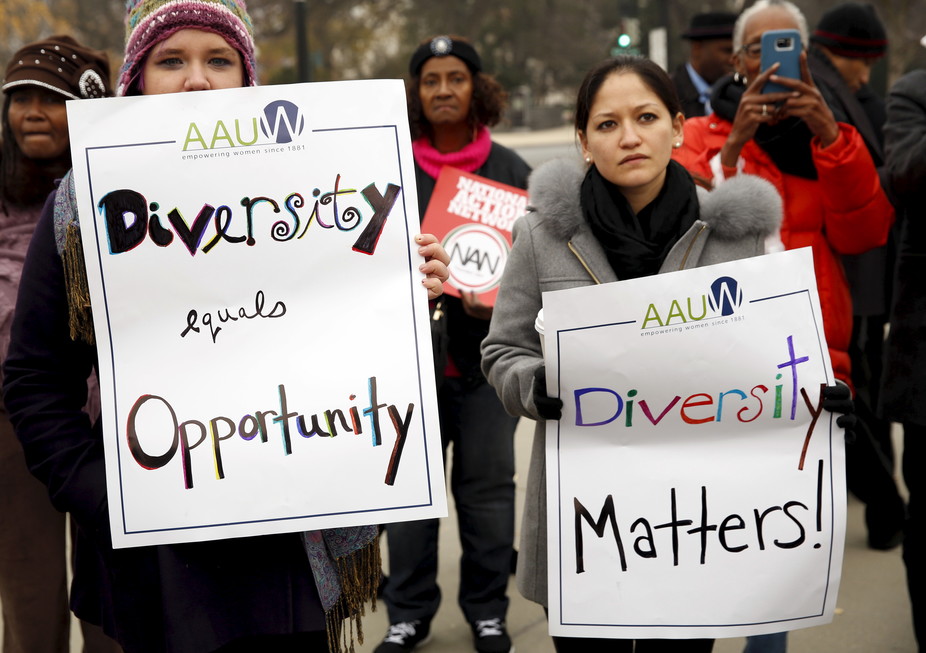Eliminating inequalities needs affirmative action

Richard J. Reddick, University of Texas at Austin; Stacy Hawkins, Rutgers University, and Stella M Flores, New York University
The Supreme Court has upheld the affirmative action admission policy of University of Texas. Abigail Fisher, a white woman, applied to the University of Texas at Austin (UT Austin) in 2008. She sued the university after she was denied admission on the grounds that the university’s race-conscious admissions policy, violated the equal protection clause of the Fourteenth Amendment.
On Thursday, June 23, the Supreme Court ruled that the race-conscious admissions program was constitutional – a decision that the three scholars on our panel welcome. They tell us why existing educational inequalities need considerations of race and ethnicity in admissions.
How else do you eliminate inequality?
Richard J. Reddick is an associate professor in educational administration at University of Texas at Austin.
UT Austin’s history on legal decisions about race in higher education goes back to Sweatt v. Painter (1950), a case that successfully challenged the “separate but equal” doctrine articulated in Plessy v. Ferguson (1898). The landmark case helped pave the way for Brown v. Board of Education (1954), which outlawed racial segregation in education.
The next test, in the Hopwood v. Texas (1996) case, came from the other direction. Cheryl Hopwood was a white applicant who was denied admission. She challenged UT Austin’s use of race in its admissions decisions as unconstitutional. The Fifth Federal Circuit Court of Appeals eliminated the consideration of affirmative action in universities and colleges in Texas. This decision was overruled in 2003.
Fisher, then, was another challenge to the university’s renewed efforts to provide educational opportunity and access to underrepresented students at predominantly white institutions.

UT Austin’s history on legal decisions about race in higher education goes back to Sweatt v. Painter. qmechanic, CC BY-NC-SA
Opponents of affirmative action often argue that metrics, such as test scores and class rank, that appear to be neutral, should be the method by which to admit students.
These arguments fail to consider the real impact that racial and socioeconomic discrimination has on educational opportunity. School resources and teacher quality differ significantly, and intangibles such as leadership opportunities often depend on subjective criteria such as teacher recommendations.
Furthermore, many students from underrepresented communities confront challenges in navigating school systems. We additionally know that standardized testing can show bias in certain populations.
In other words, these “neutral” measures actually reinforce social inequities.
The most selective institutions of higher education in the nation no longer rely solely on these metrics. They seek out students with a variety of experiences – factors that may not always correspond to test scores and class ranking.
Today’s ruling is a reassurance, as fleeting as it might be, that the massive task of eliminating educational inequality – which correlates to many other forms of inequality – can be supplemented by approaches in college admissions that consider race and ethnicity.
It does not minimize the importance of eradicating racial discrimination in all walks of life: in the words of UT Austin president Greg Fenves, “race continues to matter in American life.”
However, emphasizing the significance of careful, narrowly tailored approaches to enhancing diversity at predominantly white institutions is a victory for the scholars, researchers, administrators and families who have demonstrated how diversity provides significant educational benefits for all students and American society.
What are the implications for other colleges?
Stacy Hawkins is an associate professor at Rutgers University, where she teaches courses in Employment Law and Diversity in the Law.
The Supreme Court’s decision is cause for both celebration and circumspection.
Justice Anthony Kennedy, the court’s moderate swing justice, whose opinion was rightly predicted to be the key to the decision, undoubtedly shocked many by voting for the first time to uphold a race-conscious admissions policy.
However, the decision is more consistent with Justice Kennedy’s prior decisions, notwithstanding the difference in outcome, than might appear at first blush.
On the one hand, Justice Kennedy reaffirmed his commitment to diversity as a compelling educational interest in 21st-century America (a view he expressed in prior cases on diversity in higher education, as well as in primary and secondary schools).
On the other hand, however, Justice Kennedy also reaffirmed his long-standing belief that, notwithstanding this interest, race may play no more a role than is absolutely necessary to achieve the educational benefits of diversity.
In striking this delicate balance, Justice Kennedy sanctioned the University of Texas’ race-conscious admissions policy today, but gave fair warning that the future of this policy is by no means secure.
More important perhaps than the implications of this decision for the University of Texas is what, if any, implications this decision may have for other colleges and universities?
As Justice Kennedy acknowledged, the University of Texas is unique in its use of race to narrowly supplement a plan that admits the overwhelming majority of students (at least 75 percent) on the sole basis of high school class rank without regard to race, a feature that was critical to Justice Kennedy’s approval of the policy.
Thus, the vast majority of colleges and universities may still be left to wonder about the constitutionality of their own race-conscious admissions policies that operate more widely than Texas’ does.
With a similar case against Harvard University currently winding its way through the federal courts, the answer may not be far off.
Affirmative action bans exist in many states
Stella M. Flores is an associate professor of higher education at the Steinhardt School of Culture, Education, and Human Development at New York University.
Demography, economy and diversity are key issues facing the nation’s colleges and universities and should also be a part of their policy design.
In Fisher v. Texas today, Justice Kennedy’s opinion clearly states two outcomes. The first is that the university’s deliberation that race-neutral programs had not achieved their goals was supported by significant statistical and anecdotal evidence.

Admissions policies at universities play a key role in diversifying key areas. Supreme Court image via www.shutterstock.com
The second is that universities have the obligation to periodically reassess their admissions programming using data to ensure that a plan is narrowly tailored so that race plays no greater role than is necessary to meet its compelling interests. This is in essence an accountability mechanism for universities to follow using data and research.
Admissions policies at universities play an important role in the ability to diversify key fields relevant to the nation’s economy, including law, medicine, STEM, education and public policy, so that they can appropriately reflect and serve the unprecedented demographic expansion facing our country.
The decision ensures that pathways to the nation’s most critical educational and employment fields will stay open.
But there are other considerations and realities that include the following. First, some of the nation’s most racially diverse states will still operate under affirmative bans due to state legislation and referenda. These include California, Florida, Michigan, Arizona and Oklahoma.
Second, there is still a clear need for additional effective policies and efforts beyond a consideration of race in college admissions to address the disconnect between the demographics of the nation and its public K-12 schools and who is represented at selective colleges and universities.
Retracting the use of race nationally would have been a step toward increasing racial and ethnic inequality in schools and society. But we’re in a time where race really matters in this country and in how we learn together as a diverse society in our classrooms. This decision reflects this reality.
![]()
Richard J. Reddick, Associate Professor in Educational Administration, University of Texas at Austin; Stacy Hawkins, Associate Professor, Rutgers University, and Stella M Flores, Associate Professor of Higher Education, New York University
This article was originally published on The Conversation. Read the original article.





